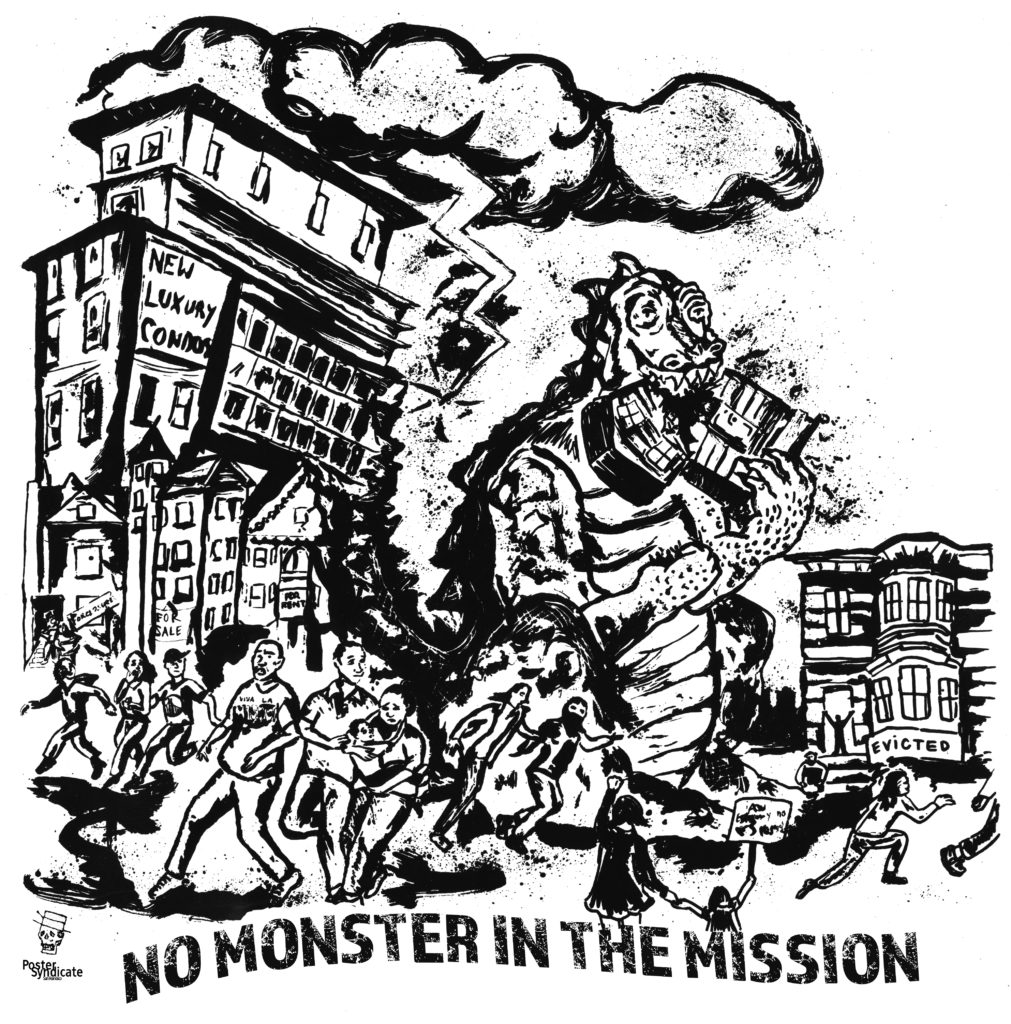
In 2013, Maximus Real Estate Partners began to plan for a housing development at 1979 Mission St. to replace the current businesses located there including a Walgreens, a Burger King, the Hwa Lei Market and spaces for the community to sit, rest, meet up with one another and sleep. Although the project was halted for a few years due to a legal battle between the real estate company and landowners, Maximus seems to be gearing up for a final showdown to move forward with the project many are referring to as the “Monster in the Mission.”
The nickname was coined by the Plaza 16 Coalition, a group dedicated to demanding for the abandonment of Maximus’s current 345-unit, 10-story project and creating instead what they call “deeply affordable housing” and community-serving businesses in that space instead. “We’re calling our plan the ‘Marvel in the Mission’” said Andy Blue, a Plaza 16 organizer who has been fighting with the coalition since 2013.
Those who oppose the construction of the Monster on Mission believe it is not only disregarding the homeless crisis in San Francisco, but an attack on the homeless community. There has been a message coinciding with the development of 1979 Mission St. known as “Clean Up The Plaza.” On their website, Clean Up The Plaza refers to the BART station plazas on 16th & Mission as ‘deplorable’ and implies the that the conditions may be in part to the average 250 members of the homeless community who visit the plaza daily.
Blue stated that with the message to “clean up” the Plaza in place, police officers have already moved forward with harassing and arresting more and more people who gather on the plaza. Although they are their own separate entity, Clean Up The Plaza has found support from Maximus Real Estate because the construction of 1979 Mission seems to be an answer to their demands. “They want to get poor people and people of color out of the plaza,” said Blue.
The real estate company has promised to include the city minimum of 41 affordable units, or 12 percent, within the construction, with 49 more affordable units to be built off-site but “affordable” is a questionable concept. According to the U.S. Department of Housing and Urban Development, families of four bringing in $100,000 a year can be considered low-income in the Bay Area, which is a far larger income than what those who are currently living in shelters, on the streets or in residential hotels can claim. “I actually live in a residential hotel,” said Chantz, a man who spends time at the 16th and Mission plaza, “The rent keeps getting higher and people can’t afford to live here.”
Despite broad opposition from over 100 organizations and many community members who have teamed up with Plaza 16, Maximus has put in millions of dollars into donations to political campaigns that benefit them as well as Astroturf campaigns, all with the goal of pushing forward with the Monster. In the BART stations they have taken down Plaza 16’s Monster in the Mission campaign posters and replaced them with their own “I Am Not A Monster” posters featuring factoids related to the construction, including one fairly ominous message reading “FACT: 48% of all of the crime that happens in the Mission takes place within 4 blocks of 16th & Mission.” It seems to be a message that supports heavy policing of the area, which many would say contributes to the criminalization of homelessness.
As the final steps to put an end to the Monster draw closer, Plaza 16 is making some new demands. They are demanding that the San Francisco planning committee meets with Maximus Real Estate to discuss the Monster project locally in the Mission as opposed to at City Hall. They believe this way more community members will be able to attend and have their voices heard. The group has also been successful in dissuading businesses’ attention to the project. A few weeks ago what was supposed to be a meeting with the real estate company and potential businesses looking to buy space in the Monster was shut down by Plaza 16 and picketers.
Overall, the coalition would like to see an end to the Monster, a decriminalization of homelessness, and a rejection of market-rate (competitive and expensive) housing, opting for deeply affordable housing instead. “I’d like to see it get easier to get more housing ‘cause it’s not enough,” said Chantz. Plaza 16 holds a continuous letter writing campaign in order to get these goals accomplished and encourages the citizens of San Francisco to bombard the Board of Supervisors and Planning Committee with their concerns in order to stop the Monster in the Mission. ≠

